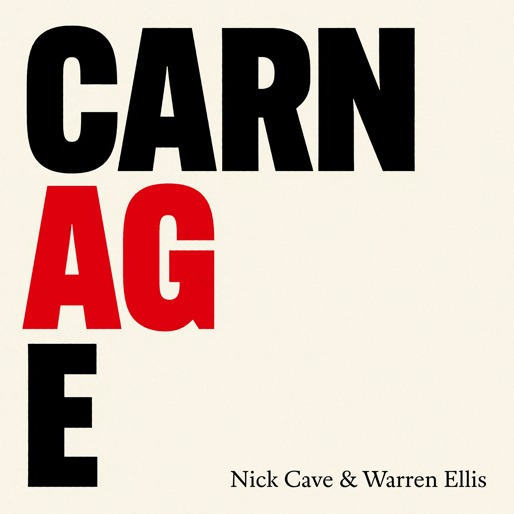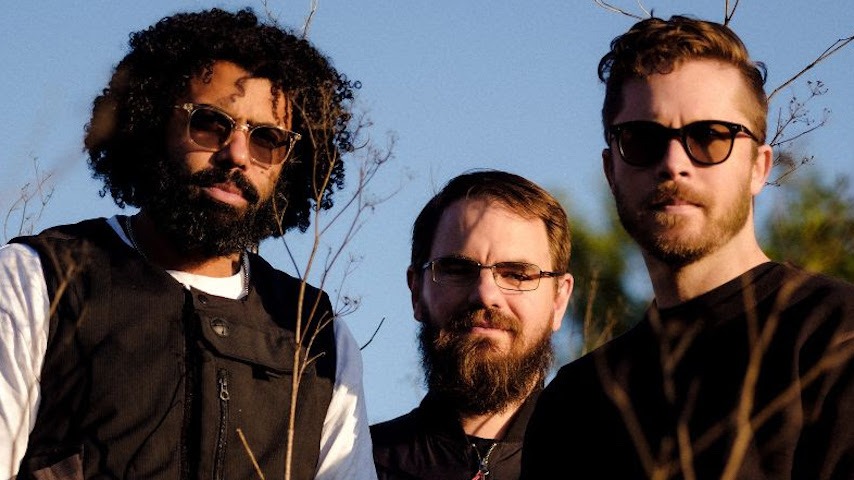If, when imagining the iconic cocktail lounge scenes from his TV series Twin Peaks, filmmaker David Lynch had wanted to convey a more true-to-life embodiment of human darkness, he might have conjured something like Nick Cave. That’s not to take anything away from Julee Cruise, or Lynch himself, but just to say that Cave has at times cut closer to the marrow of what makes us monstrous. When Cave first rose to international prominence in the late ’70s and early ‘80s as the frontman of the Australian post-punk outfit The Birthday Party, his aura of ghoulish antagonism represented the kind of danger we’ve come to expect from the trash-strewn fringes of rock. That Cave was cultured and literate only added more edge to his brand of menace.
When we look back, it’s difficult to put ourselves in the shoes of people who, living the moment in real time, viscerally understood how The Birthday Party and their ilk threatened establishment values. All it takes is one exposure to, say, the noisy clang of ‘90s alt-rock act The Jesus Lizard and the context for understanding Cave’s origins is easily lost. Since striking out on his own in 1983 as the leader of The Bad Seeds, however, Cave has time and again redefined what it means to be provocative. A drastically oversimplified summation of his career arc reads as follows: The Bad Seeds inherited some of The Birthday Party’s penchant for aggression and force, but gradually began to favor a more delicate—though no less disquieting—approach that has taken various forms over time. Recent Bad Seeds efforts like 2016’s Skeleton Tree and 2019’s Ghosteen, for example, verge on ambient music, with Cave’s piano and baritone draped in an electronic haze that’s so fine, it seems to evaporate as one listens.
Crucial to the conception and development of those last two albums has been multi-instrumentalist Warren Ellis. Along with co-producing both Skeleton Tree and Ghosteen, Ellis—a member of the Bad Seeds since 1994—has also collaborated with Cave on 16 years’ worth of scores for film and stage. It’s easy to look at Carnage, the first proper standalone album from Cave and Ellis working as a duo, as the album Ghosteen would have turned out to be, had COVID prevented Ellis and Cave from enlisting the rest of the Bad Seeds once they were done with their initial phase of creating song sketches as a pair. It’s also temping to frame Carnage in-line with the rest of their soundtracks, only without a film or play to provide narrative structure. The fact is, though, that the forced isolation of the last year seems to have genuinely rattled Cave, which is saying a lot for an artist whose body of work is so strongly permeated by morbidity and bleakness.
For such a literate person, Cave does the new album a bit of a disservice by choosing to describe it as “a brutal but very beautiful record nested in a communal catastrophe.” That is, of course, an accurate description of what this music is, but it doesn’t really encompass everything Carnage can blossom into once it reaches the listener’s ear. Part of what’s made Cave and Ellis’ voluminous body of work so beguiling is the way that primary-color descriptors like “brutal” and “beautiful” lose their meaning in the endless shades the two musicians have at their disposal. And to prime the audience to expect something that slots neatly into Cave’s setup is to constrain an extraordinarily complex work of art. Regardless of how the COVID backstory makes the music relatable, the ambiguity here—both disorienting and rewarding—is one of Carnage’s main selling points.
Does death loom over this album? Well … yes and no. Opener “Hand of God” begins on the kind of mournful note we’ve come to associate with Cave as much as we do his pompadour: Cave sings about a “kingdom in the sky” over a dirgey accordion drone and a piano tinkling in (what else?) a sad register at a foot-dragging tempo. The interplay between the two backing instruments is so listless, so forlorn, it’s as if Cave and Ellis wanted listeners to picture something predictably melodramatic like, say, two people slow-dancing in a frontier saloon during a plague. (Think of an image, pile on the pathos even thicker, and you’ll be in the ballpark.)
In just a few bars, however, Carnage gets off the runway of familiarity, propelled by a thumping electronic beat and strings that almost strain toward hopefulness. Whatever the images that appeared on your mental screen just seconds before, they dissolve as quickly as they came. Suddenly energized, mysterious and at least tentatively upbeat, “Hand of God” leaves you in a place where you don’t quite know where you are. As the music builds towards Cave repeating the phrase “let the river cast his spell on me” in a nakedly out-of-tune croak, the sense coming loud and clear from Cave’s voice and Warren’s music isn’t one of foreboding but of freedom. As a backing chorus gets louder and louder, chanting the words “hand of God, hand of God, hand of God,” the feeling of exhilaration is undeniable.
Just when you thought everything that needed to be said about the COVID lockdown experience had already been put to music, along comes Carnage to, well, say it again, but in ways that both illuminate and leave us with lingering questions. It’s hard to imagine that Cave and Ellis aren’t being intentional when they skirt the line of self-parody on the title track, which begins with soft, tremoloing keyboard puffs mimicking a church organ funeral hymn as a frail guitar line ripples sadness across a wide expanse of space. Meanwhile, Cave half-sings, half-speaks, “I always seem to be saying a goodbye / and rolling through the mountains like a train,” his voice booming and threatening to overtake the music even as he tamps himself down to a near-whisper.
If Cave didn’t innately possess the substance to eclipse his stylized image and musical choices, these types of haunted overtures, which he has returned to with such frequency, would have soured into actual self-parody long ago. No doubt, Cave is aware of the fine line he’s walking when he sings verses like, “I’m a barefoot child, watching the rain,”“I’m sitting on the balcony reading Flannery O’Connor” and “This song is like a raincloud circling overhead.” We can reasonably conclude that Cave and Ellis walk this line on purpose because on the very next track, titled “White Elephant,” the pair shrugs off the title track’s clichés as easily as James Brown used to remove his cape. In fact, in the transition between the title track and “White Elephant,” with its near-subsonic bass throb and lite industrial percussion clatter, Cave and Ellis are essentially saying, “these are clichés are ours to play with—we invented them, after all.”
The transition wouldn’t be nearly as satisfying if the contrast weren’t so sharp, but on “White Elephant,” as well as several other moments on the album, the pair manages to explore new ground—a monumental feat when you consider that Cave was breaking new ground from the start. Against all odds, Cave has somehow stayed one step ahead of running dry on ideas. He has, of course, had no small help from Ellis, who may as well appear in photos as an eight-armed figure holding an instrument in each hand. Like Cave, Ellis favors a spare touch, and his sense of economy is as powerful a tool as his versatility.
Aficionados will no doubt pore over the fine-tuned distinctions between Carnage and previous work from Cave and Ellis, but Carnage arguably makes as worthy an entry point into the Nick Cave canon as any other title a superfan might recommend. Of course, it’s also reasonable that listeners will scan between the lines for any perceivable change in temperament since the deaths of Cave’s 15-year-old son Arthur in 2015 and Bad Seeds keyboardist Conway Savage in 2018. The fact is, though, that neither of those losses—not even the greater tragedy of COVID—have to limit what this listening experience feels like. If and when COVID fades into distant memory, Carnage will still have much to offer.
Nick Cave may very well be the avatar for the idea that what we think of as “mellow” can be “heavy” and vice versa. With Carnage, he and Ellis prove that point yet again. Believe it or not, they also stretch themselves again, suggesting there may be no end to the inspiration they have up their sleeves.
Saby Reyes-Kulkarni is a longtime contributor at Paste. He believes that a music journalist’s job is to guide readers to their own impressions of the music. He also dreams of being a “setlist doctor” to the bands you read about in these pages, and has started making playlists for imaginary shows that your favorite band never actually played. You can read his work, listen to his interviews and playlists at feedbackdef.com, and find him on Twitter.




